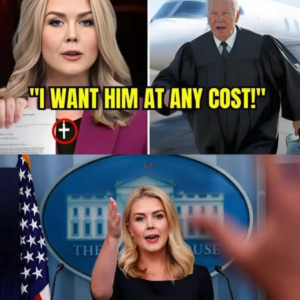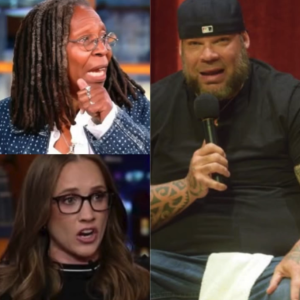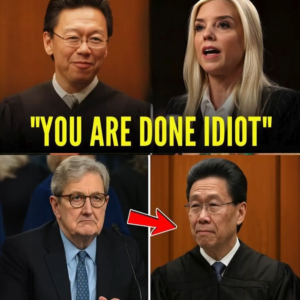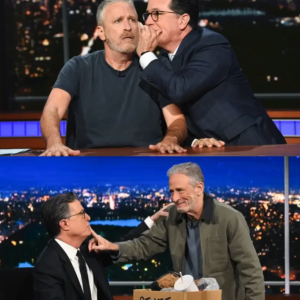It wasn’t a comedy set. There was no desk, no band, no laugh track. Just a quiet interview at the Reagan Presidential Library, a camera lens, and Jay Leno — the man who once owned the most powerful hour in American television — sitting calmly across from former Fox News editor David Trulio.
And then, without a smile, Leno said it:
“Why shoot for half the audience?”
“Why not try to get the whole?”

He didn’t flinch. He didn’t wink. He just let the question hang in the air.
And it did — like a lit fuse.
What no one knew in that moment was how fast that fuse was burning. Four days later, CBS announced the cancellation of The Late Show with Stephen Colbert. Officially? A “financial decision.” But inside media circles, Leno’s interview was already being replayed, dissected, quoted, subtitled, memed.
He never mentioned Colbert by name.
But he didn’t have to.
A Veteran Returns — and the Genre Starts to Shake
Jay Leno, now 74, hasn’t hosted a network show in over a decade. But in this moment, he sounded less like a retired comedian — and more like a coroner.
He wasn’t mocking anyone. He wasn’t ranting about “woke culture” or whining about cancelation. What he delivered, instead, was something more unsettling: a quiet indictment of his successors.
“Now you have to be content with half the audience,” he said. “Because you have to give your opinion.”
There was no laughter. Just a pause. And a subtle shift in tone.
Leno didn’t need to explain what “opinion” meant. Everyone watching knew exactly who — and what — he was referring to.
The Shadow of Colbert
On paper, this was just a friendly fireside interview posted to YouTube. But the timing — July 15 — was razor-sharp. CBS’s bombshell cancellation of The Late Show would drop just two days later, on July 17.
And suddenly, Leno’s comments weren’t just remarks.
They were premonitions.
He warned about hosts “cozying up to one side or the other.” About losing half the country with smugness disguised as satire. About the danger of turning a universal art form — late-night comedy — into a partisan echo chamber.
And then, bam — Colbert was gone.
Officially, CBS said the move was purely financial. But longtime Late Show staffers weren’t buying it. Especially not after the network’s parent company, Paramount Global, quietly agreed to pay $16 million to Donald Trump to settle a defamation case tied to 60 Minutes — a deal many saw as a political appeasement.
The very next day, Trump crowed: “I absolutely love that Colbert got fired.”
Colbert’s response? Blistering: “Go f*ck yourself.”
But the real damage had already been done. Not just to Colbert — but to the entire late-night genre.
Leno’s Silence Cuts Deeper Than Most Outrage Ever Could
It wasn’t the first time Leno had warned of this shift. In 2019, on The View, he said bluntly: “I always liked to humiliate and degrade both sides equally.”
He said it with a laugh. But he meant every word.
That’s what set him apart during his reign: Leno’s jokes didn’t carry flags. They carried punchlines. Yes, he hit Democrats. Yes, he hit Republicans. Sometimes in the same sentence.
That approach may sound quaint now — even outdated. But the numbers back him up: a 2009 study from George Mason University found that from 1992–2008, Leno told 4,468 jokes about Bill Clinton — nearly 50% more than George W. Bush. He hit Al Gore. He hit Hillary. He even made O.J. and Monica Lewinsky regular punchlines.
It wasn’t political balance for balance’s sake.
It was reach.
It was the belief that comedy didn’t have to be a loyalty test.
But Today? It Feels Like a Trial.
Stephen Colbert, Seth Meyers, John Oliver, Jimmy Kimmel — even Jon Stewart — have all become known for editorial monologues masquerading as entertainment. Some call it bold. Others, like Leno, call it division with a laugh track.
In his interview, Leno put it bluntly:
“People come to a comedy show to get away from things — the pressures of life. I don’t think anybody wants to hear a lecture.”
He wasn’t scolding. He was mourning.
CBS’s Ax Falls — And No One Buys the “Budget” Excuse
Inside the industry, the timing is seen as more than coincidence.
Colbert’s show had just wrapped its most politically active run in years. The network was under new pressure from Skydance Media — whose merger with Paramount was approved in early July. And Trump had just declared the Colbert ouster “a victory.”
Add in Leno’s soft-spoken critique?
The result: a perfect storm of media paranoia.
And then came the whispers — that The Late Show wasn’t just canceled. It was neutralized.
Leno Didn’t Light the Fire. He Just Pointed to the Smoke.
By July 22, the Reagan Foundation posted a clip from Leno’s interview with a simple caption:
“Late-night used to be about laughs — not lectures.”
It didn’t go viral like Colbert’s mic-drop moments. But it hit deeper in other circles.
Media strategists. Industry veterans. Former producers. Executives.
All of them asking the same thing:
“Did we just watch Leno end an era… without ever raising his voice?”
And The Fallout Isn’t Over
Within a week of the cancellation, a former Colbert producer anonymously told The Atlantic:
“Jay said what everyone in the industry has been whispering for five years. The genre’s not dying — it’s self-harming.”
That quote lit a second fuse.
Because now, the “quiet middle” of America — the viewers Leno says still exist — are wondering if they were never really the audience to begin with.
Final Shot: A Legacy, Rewritten Without a Shout
Jay Leno didn’t spike the football. He didn’t mock the networks. He didn’t laugh.
He just offered a diagnosis. A calm, cool, calculated X-ray of a genre that once ruled the airwaves — and now can’t stop losing viewers, advertisers, and soul.
In his words:
“I got hate mail from Republicans and Democrats… over the same joke. That’s how you know it worked.”
No one clapped. But millions nodded.
Sometimes, the most devastating punchlines are the ones you don’t hear at all.
And now, as late-night stares into its own mirror — the silence Jay Leno left behind may be the loudest legacy of all.
This article is based on recent interviews, public statements, and composite industry analysis. Interpretive commentary reflects the cultural tone and public discourse surrounding the CBS cancellation. Some character perspectives have been dramatized to capture the atmosphere surrounding the shift in late-night television.





